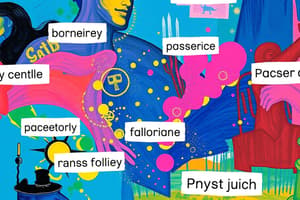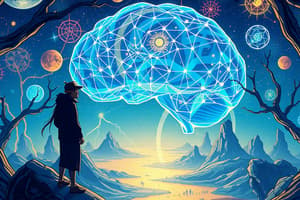Podcast
Questions and Answers
What is psychology?
What is psychology?
- The study of physical fitness
- The scientific study of mind and behavior (correct)
- The analysis of social norms
- The study of plants
What is data?
What is data?
Any information collected through formal observation or measurement.
What is hindsight bias?
What is hindsight bias?
The tendency to think that we could have predicted something that has already occurred.
What does the scientific method involve?
What does the scientific method involve?
What are levels of explanation?
What are levels of explanation?
What are individual differences?
What are individual differences?
Structuralism uses the method of introspection to identify the basic elements of psychological experience.
Structuralism uses the method of introspection to identify the basic elements of psychological experience.
What is functionalism?
What is functionalism?
What does psychodynamic psychology focus on?
What does psychodynamic psychology focus on?
What is behaviorism?
What is behaviorism?
What does cognitive psychology study?
What does cognitive psychology study?
What is social-cultural psychology?
What is social-cultural psychology?
What is heritability?
What is heritability?
In the nature vs nurture debate, what are we primarily discussing?
In the nature vs nurture debate, what are we primarily discussing?
The method of learning about psychological processes where participants describe their experiences is called ___.
The method of learning about psychological processes where participants describe their experiences is called ___.
What is evolutionary psychology?
What is evolutionary psychology?
What is fitness in terms of psychology?
What is fitness in terms of psychology?
What defines social norms?
What defines social norms?
What does the endocrine system regulate?
What does the endocrine system regulate?
What are neurons?
What are neurons?
What is synaptic transmission?
What is synaptic transmission?
Flashcards are hidden until you start studying
Study Notes
Introduction to Psychology
- Psychology is defined as the scientific study of mind and behavior.
- Data refers to any information collected through formal observation or measurement.
Key Concepts in Psychological Science
- Hindsight bias describes the tendency to believe that one could have predicted an outcome after it has already occurred.
- The scientific method involves a systematic set of assumptions and procedures for conducting empirical research.
Perspectives in Psychology
- Levels of explanation denote the various perspectives used to understand behavior.
- Individual differences highlight the variations in physical or psychological traits among people.
Historical Schools of Thought
- Structuralism utilizes introspection to identify the basic elements of psychological experience.
- Functionalism seeks to understand the evolutionary purpose of psychological traits.
- Psychodynamic psychology focuses on unconscious influences and childhood experiences.
- Behaviorism asserts that psychology should study observable behavior rather than the mind.
- Cognitive psychology examines mental processes like perception, memory, and judgment.
- Social-cultural psychology studies how social situations and cultures affect behavior.
Nature vs. Nurture Debate
- Nature vs. nurture explores the relative influence of genetics and environment on individual behavior.
- Heritability measures how much observed differences in traits among individuals can be attributed to genetics.
Key Psychological Questions
- Free will vs. determinism considers personal control over actions versus influence from environmental forces.
- Accuracy vs. inaccuracy relates to human capacity for processing information.
- Conscious vs. unconscious examines awareness of one's actions and influences from outside awareness.
Research Methodologies
- Basic research addresses fundamental behavioral questions, while applied research focuses on real-world implications.
- Descriptive research provides snapshots of current situations without assessing relationships among variables.
- Correlational research identifies relationships between variables and allows predictions but does not imply causation.
- Experimental research manipulates variables to infer causal relationships and draw conclusions.
- Case studies provide detailed insights into individual experiences, while surveys collect data on beliefs and behaviors.
Statistical Concepts
- Descriptive statistics summarize data distributions, including mean, median, mode, and standard deviation.
- Normal distribution reflects a bell-shaped data distribution.
- Correlation coefficients measure the strength and direction of relationships between variables.
Research Validity and Ethics
- Internal validity assesses the trustworthiness of causal conclusions.
- External validity evaluates the generalizability of research findings.
- Construct validity ensures research measures what it intends to measure.
- Ethical practices involve informed consent, deception protocols, and debriefing participants after studies.
The Nervous System
- The nervous system consists of a vast network of specialized cells transmitting information across the body.
- The central nervous system includes the brain and spinal cord, while the peripheral nervous system connects the CNS to other body parts.
Neurons and Communication
- Neurons are fundamental cells of the nervous system, with key components including soma, dendrites, and axons.
- The myelin sheath insulates axons for faster signal transmission, while action potentials indicate nerve impulses' electrical changes.
- Neurotransmitters are chemicals that transmit signals across synapses between neurons, impacting communication in the nervous system.
Studying That Suits You
Use AI to generate personalized quizzes and flashcards to suit your learning preferences.




